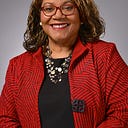Dr. Rhonda Johnson — I Survived COVID-19!
“How on earth did the COVID doctor get COVID?”
“For the last year you’ve been telling us how to prevent COVID and you got it?”
“If you got COVID as careful as you’ve been, there’s no hope for the rest of us.”
These are just some of comments I heard from friends and family. I was one of the breakthrough COVID-19 infections, getting infected nearly 6 months to the day after my second Moderna vaccine. True, I had been so careful, but I went to my favorite brunch buffet style restaurant the day before Labor Day. Two days later I showed symptoms of the Delta variant and my PCR test was positive at three days after my restaurant indulgence.
My cousin, who is also a Pastor, convinced me to go public and my experiences with COVID can be found on my YouTube channel in a dedicated playlist (https://youtube.com/playlist?list=PLDX7iHdPqYal3SjhHDSRH48QVnukXTzEK)
Between the vaccines and the monoclonal antibody infusion, I survived COVID-19. I write this in a reflective mindset as two months later, I am continuing to recover post covid.
What was so remarkable about my breakthrough COVID infection was how fast I felt like I was going down. In the first four days my temperature got as high as 103 degrees, and I had feelings of enormous weights on the frontal part of my head and deep down in my chest. I never coughed so much in my life; muscles in my chest wall and upper abdomen — are still sore from all of the coughing. The lost of taste came early — by day four and the loss of smell on day seven, and it persisted for about three weeks, even after I tested negative for the virus.
The turning point for me was the monoclonal antibodies. Within 24 hours after receiving them via IV infusion, I felt that I had won the battle with COVID. I highly recommend for anyone who meets the eligibility criteria, to get the monoclonal antibodies as soon as possible.
As for my recovery, it is on my body’s clock and it is taking a while. Some pulmonary symptoms persist — coughing and shortness of breath, however it gets better. Every week I can feel real progress. The deconditioned state is humbling — the daily living tasks require so much more effort: meal preparation, getting dressed, grocery shopping have left me exhausted at times.
Most troubling is the short term memory lapses — especially when someone asks me a question and I can’t make a connection. It feels like my brain is trying but there’s a busy signal at the other end. At first, I was so distressed by this, I had bouts of crying spells, but I am reassured by the repeated examples of what’s forgotten gets remembered eventually — usually in minutes to hours — meaning this forgetfulness appears temporary.
I posted my news of my COVID infection on September 9th on Facebook; this message reviewed over 360 views, was shared eleven times and I received 96 likes and 118 comments offering prayers and get well wishes. A follow up message two days later on how I was managing received 203 views, 15 shares, 68 likes, and 50 comments. Most people thanked me for sharing my story and said they were praying for my quick return to health and a full recovery. One said “you getting COVID-19 really shook me. Redoubling my caution.” Another said, “your honesty and transparency is remarkable.” Another said, “Thank you for keeping all of us informed.”
I will never forget what one physician said to me: “Please don’t feel bad that you got COVID-19. We’re 19 months into this pandemic and at least we have vaccines, treatment protocols and monoclonal antibodies that we did not have 18 months ago. Getting COVID may be inevitable for us all — it might just be a matter of when, not if.”
As I reboot two months to the day after testing positive, I am consumed with living. Just ‘ordinary living’ has extra meaning for me. I love ordinary smells, I sing more, and I am taking one day at a time with naps when needed. Life is returning to the ‘new normal’ — although I am much more mindful and far more flexible. I appreciate all of the sacrifices of health care professionals who are weary and understaffed. I had some conversations with really caring nurses during my acute phase of COVID and they shared how they are coping with direct patient care throughout this pandemic.
I am profoundly grateful for all of the calls, texts, prayers, cards and messages of encouragement during my illness and recovery; and for my family who showered me with love. And yes, I have continued to provide COVID-19 public education with a stronger personal message of how being fully vaccinated probably saved my life. It’s said the most powerful message is our personal story. Well, this is one to add to the collection.
